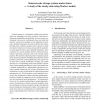Free Online Productivity Tools
i2Speak
i2Symbol
i2OCR
iTex2Img
iWeb2Print
iWeb2Shot
i2Type
iPdf2Split
iPdf2Merge
i2Bopomofo
i2Arabic
i2Style
i2Image
i2PDF
iLatex2Rtf
Sci2ools
P2P
2006
IEEE
2006
IEEE
Internet-Scale Storage Systems under Churn -- A Study of the Steady-State using Markov Models
Content storage in a distributed collaborative environment uses redundancy for better resilience and thus provides good availability and durability. In a peer-to-peer environment, where peers continuously leave and rejoin the network, various lazy strategies can be employed to maintain a minimal redundancy of stored content in the system. Existing static resilience analyses fail to capture in detail the system’s behavior over time, particularly the probability mass function of the actual available redundancy, since it ignores the crucial interplay between churn and maintenance operations, and looks only at the average system property. We perform a Markovian time-evolution analysis of the system specified by probability mass function of each possible system state, and establish that given a fixed rate of churn and a specific maintenance strategy, the system operates in a corresponding steady-state (dynamic equilibrium). Understanding the behavior of the system under such a dynamic...
Maintenance Scheme | Maintenance Strategy | P2P 2006 | Peer-to-Peer Computing | Probability Mass Function |
| Added | 12 Jun 2010 |
| Updated | 12 Jun 2010 |
| Type | Conference |
| Year | 2006 |
| Where | P2P |
| Authors | Anwitaman Datta, Karl Aberer |
Comments (0)

